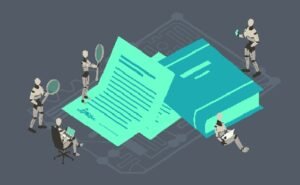05-07-2025
BRUSSELS: The European Union’s landmark rules on artificial intelligence will be rolled out according to the legal timeline in the legislation, the European Commission said on Friday, dismissing calls from some companies and countries for a pause.
 Google owner Alphabet, opens new tab, Facebook owner Meta, opens new tab and other US companies as well as European businesses such as Mistral and ASML, opens new tab have in recent days urged the Commission to delay the AI Act by years.
Google owner Alphabet, opens new tab, Facebook owner Meta, opens new tab and other US companies as well as European businesses such as Mistral and ASML, opens new tab have in recent days urged the Commission to delay the AI Act by years.
“I’ve seen, indeed, a lot of reporting, a lot of letters and a lot of things being said on the AI Act. Let me be as clear as possible, there is no stop the clock. There is no grace period. There is no pause,” Commission spokesperson Thomas Regnier told a press conference.
“We have legal deadlines established in a legal text. The provisions kicked in February, general purpose AI model obligations will begin in August and next year, we have the obligations for high risk models that will kick in in August 2026,” he said.
The Commission plans to propose steps to simplify its digital rules towards the end of the year, such as cutting back on reporting obligations for small companies.
Some companies have voiced concerns about the compliance costs and tough requirements of the AI rules, which aim to set guardrails on a technology key to multiple sectors of the economy and currently led by the United States and China.
The call for a pause came from a broad spectrum of European companies. In addition to technology companies such as ASML and Mistral, Airbus, Siemens Energy and supermarket chain Carrefour also backed the #stoptheclock campaign. Smaller AI players such as ElevenLabs and Cradle also supported the open letter.
The CEOs warned of unclear, overlapping, and increasingly complex EU regulations. Their concerns focus primarily on the potential impact on European competitiveness in the global AI race.
 The AI Act will come into force in phases. Specific provisions already came into effect in February. The next step involves the obligations for general-purpose AI models which will take effect in August 2025. “And next year, we have the obligations for high risk models that will kick in in August, 2026,” Rangier explained.
The AI Act will come into force in phases. Specific provisions already came into effect in February. The next step involves the obligations for general-purpose AI models which will take effect in August 2025. “And next year, we have the obligations for high risk models that will kick in in August, 2026,” Rangier explained.
This step-by-step approach should provide companies with sufficient time to adapt. However, several tech companies fear that the new rules will hamper innovation. They point to the complexity and ambiguity of certain aspects of the legislation.
European Commissioner Leaves door open
Despite the Commission’s firm statements, some uncertainty remains. Finnish European Commissioner Henna Virkkunen had previously indicated that she would decide whether the AI Act should be postponed. If certain standards and guidelines are not ready in time, she said she was prepared to set aside parts of the law temporarily.
The final decision rests with the European institutions. For now, the Commission is sticking to the original timetable which means that companies must prepare for the upcoming obligations.
Dozens of CEOs have called on the European Commission to pause the EU AI Act. Several restrictions were set to take effect in August but there is now a push to stop them. There is a good chance that this will happen.
In an open letter, the CEOs are asking for a two-year “clock stop,” essentially a pause, to iron out any potential problems with the law. To make a stand in the AI battle, the leaders of European tech companies want to ensure that “unclear, overlapping, and increasingly complex EU regulations” do not get in the way. (Int’l Monitoring Desk)
 Pressmediaofindia
Pressmediaofindia




